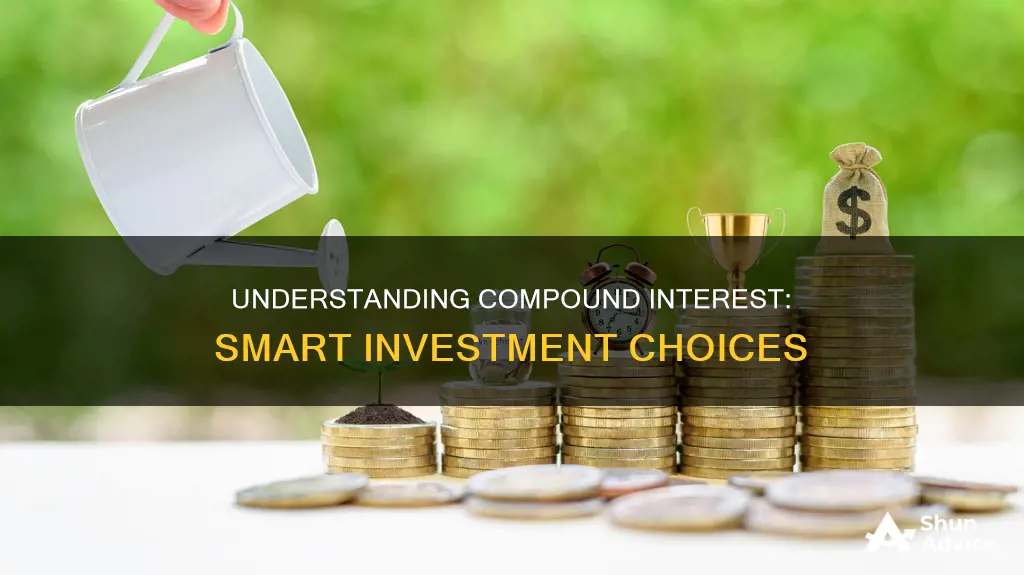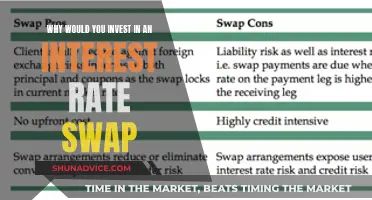
Compound interest is a powerful financial concept that can help your money grow over time. It is a process of earning interest on both the original amount of money invested and any accumulated interest from previous periods. The larger the investment return, the bigger the difference that compounding can make. For example, a $1,000 investment at a 5% annual rate over 30 years will grow exponentially. However, while compounding can work in your favour as an investor, it can also work against you when it comes to debt, causing balances to swell if left unchecked.
| Characteristics | Values |
|---|---|
| How it works | Compound interest reinvests earnings, allowing investments to accelerate their growth |
| How it affects your investment choices | The larger your investment return, the bigger the difference that compounding can make. The longer you save or invest your money, the more your returns can grow. |
| How often compounding takes place | How often your money earns interest affects its growth |
| How to maximise the effect | Workplace retirement plans and IRAs reinvest dividends and interest payments for you. If you have a brokerage account, opt to have those earnings reinvested to purchase additional stocks or bonds |
What You'll Learn
- The longer you save or invest, the more your returns can grow
- Reinvesting earnings ensures each compounding period starts with a larger base
- How often compounding takes place can affect your savings or investment performance?
- Compound interest can help you achieve your financial goals
- Compound interest can work against you when it comes to debt

The longer you save or invest, the more your returns can grow
Compound interest is a powerful financial concept that can help your money grow over time. It refers to the process of earning interest on both the original amount of money invested (the principal) and any accumulated interest from previous periods. This means that, unlike simple interest, which calculates returns only on the original principal, compound interest reinvests earnings, allowing investments to accelerate their growth.
For example, let's say you invest $1,000 at a 5% annual rate over 30 years. With compound interest, your money will grow exponentially, and you will end up with significantly more than if you had only earned interest on the initial principal. This is because each compounding period starts with a larger base, as reinvested earnings ensure that interest accumulates on a growing sum.
The frequency of compounding can also affect your savings or investment performance. While the effect is often modest, the more often your money earns interest, the more it will grow. This is why it is important to maximise the effect of investment compounding by reinvesting dividends and interest payments. For example, workplace retirement plans and IRAs automatically reinvest dividends and interest payments, and if you have a brokerage account, you can opt to have those earnings reinvested to purchase additional stocks or bonds.
By understanding the power of compound interest and the role of time and reinvestment, you can make more informed investment choices and work towards achieving your financial goals.
Understanding the Correlation Between Interest Rates and Investments
You may want to see also

Reinvesting earnings ensures each compounding period starts with a larger base
Compound interest grows your money exponentially over time. For example, a $1,000 investment at a 5% annual rate over 30 years will grow exponentially. Without reinvesting, interest only accumulates on the initial principal, significantly reducing potential gains.
The larger your investment return, the bigger the difference that compounding can make. Likewise, the longer you save or invest your money, the more your returns can grow. How often compounding takes place can also affect your savings or investment performance.
Workplace retirement plans and IRAs reinvest dividends and interest payments for you. If you have a brokerage account, you can opt to have those earnings reinvested to purchase additional stocks or bonds.
Trump's Dakota Pipeline Interest: Conflict or Investment?
You may want to see also

How often compounding takes place can affect your savings or investment performance
How often compounding takes place can have a significant impact on your savings or investment performance. The more frequently your money earns interest, the more it will grow. For example, if you invest $1,000 at a 5% annual rate over 30 years, the power of compound interest will see your wealth grow exponentially.
Compound interest refers to the process of earning interest on both the original amount of money invested (the principal) and any accumulated interest from previous periods. This means that each compounding period starts with a larger base, accelerating growth. For instance, if you invest $1,000 and earn $50 in interest in the first year, in the second year you will earn interest on $1,050, and so on.
The effect of compounding can be maximised by reinvesting dividends and interest payments. This ensures that each compounding period starts with an even larger base, further accelerating growth. For example, workplace retirement plans and individual retirement accounts (IRAs) automatically reinvest any dividends or capital gains from stock holdings, enabling increased investment returns over time.
It is important to note that while compounding can work in your favour as an investor, it can also work against you when it comes to debt, causing balances to swell if left unchecked. Therefore, it is crucial to understand the concept of compound interest to make informed decisions about your savings and investments.
Investment Loan Interest: Higher or Lower?
You may want to see also

Compound interest can help you achieve your financial goals
For example, if you invest $1,000 at a 5% annual rate over 30 years, compound interest will allow your wealth to grow exponentially. This is because each compounding period starts with a larger base, accelerating growth.
To maximise the effect of compound interest, you can reinvest your earnings. This could be done by purchasing additional stocks or bonds, or by contributing to a workplace retirement plan or IRA, which automatically reinvests dividends and interest payments for you.
It is important to note that while compound interest can work in your favour as an investor, it can also work against you when it comes to debt, causing balances to swell if left unchecked. Therefore, it is crucial to understand the concept of compound interest and how it can affect your finances.
Investing Strategies for Rising Interest Rates: Where to Focus
You may want to see also

Compound interest can work against you when it comes to debt
Compound interest is a powerful financial concept that can help your money grow over time. However, it is important to note that financial instruments can both rise and fall in value, and there is a risk that you will not get the money you invested back. Therefore, it is important to learn as much as you can about this concept to stay on track to reaching your financial goals.
To get a better sense of how compounding can affect your money, consider using a compound interest calculator, such as the U.S. Securities and Exchange Commission's compound interest calculator. This calculator allows you to adjust the compounding frequency or your hypothetical investment, so you can estimate its influence on your total balance over time. Additionally, how often your money earns interest affects its growth, too.
Workplace retirement plans and individual retirement accounts (IRAs) reinvest dividends and interest payments for you. If you have a brokerage account, opt to have those earnings reinvested to purchase additional stocks or bonds. The larger your investment return—whether it's the interest rate on a bank account or bond or a reinvested stock dividend—the bigger the difference that compounding can make.
Acorn Investments: Interest Payments and Your Money
You may want to see also
Frequently asked questions
Compound interest is a financial concept that allows you to earn interest on both the initial amount invested and the interest accumulated in previous periods. This means that your money grows exponentially over time.
Compound interest can help you achieve your financial goals by maximising the growth of your investments. You can use a compound interest calculator to estimate the influence of compounding on your total balance over time.
While compound interest can work in your favour as an investor, it can also work against you when it comes to debt. Balances can swell if left unchecked, so it's important to stay informed about this concept to stay on track with your financial goals.







